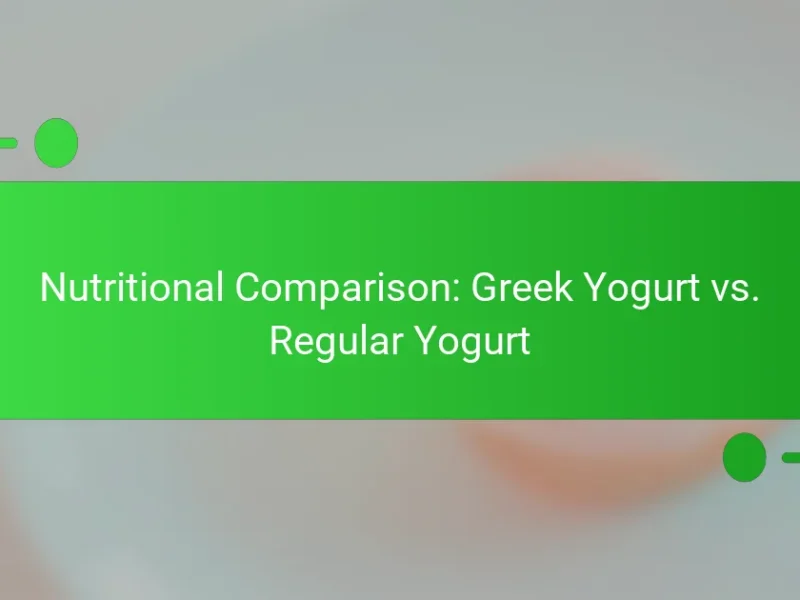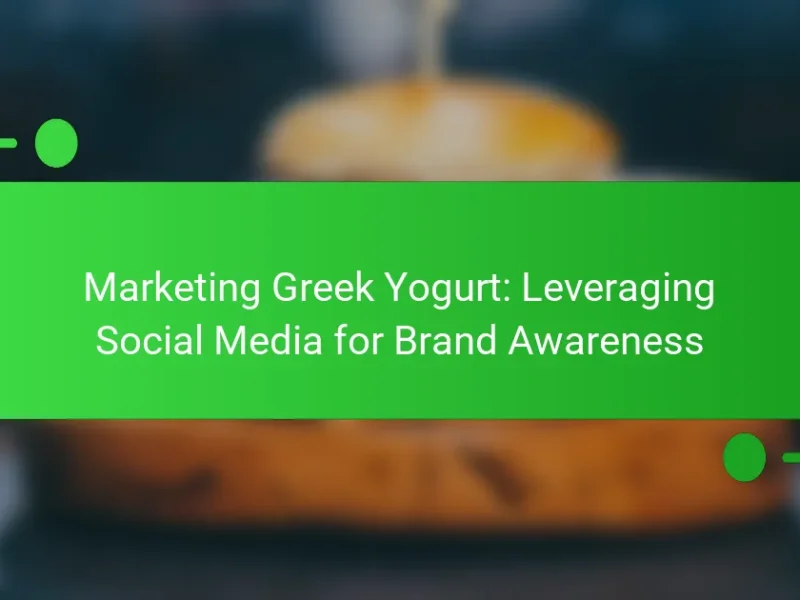Greek yogurt is positioned as a healthy choice for consumers, particularly those who are health-conscious. Marketing strategies for Greek yogurt emphasize its nutritional benefits, such as high protein content and probiotics, while utilizing eye-catching packaging and clear labeling to enhance visibility. Social media platforms, especially Instagram and Facebook, play a crucial role in engaging younger demographics through influencer partnerships and authentic endorsements. Challenges in marketing Greek yogurt include overcoming misconceptions about calorie content, competition from alternative health foods, and the impact of premium pricing on budget-conscious consumers. Transparency in health claims is vital for building trust and fostering brand loyalty in a competitive market.

What are Greek Yogurt Marketing Strategies?
Greek yogurt marketing strategies focus on appealing to health-conscious consumers. Brands utilize health claims to highlight nutritional benefits. They often emphasize high protein content and probiotics. Packaging plays a crucial role in attracting attention. Eye-catching designs and clear labeling enhance visibility. Social media campaigns target younger demographics effectively. Influencer partnerships help to increase brand credibility. Promotions and discounts encourage trial among new customers. These strategies collectively position Greek yogurt as a healthy choice in a competitive market.
How do these strategies target health-conscious consumers?
Greek yogurt marketing strategies specifically target health-conscious consumers by emphasizing nutritional benefits. These strategies highlight high protein content, low sugar levels, and probiotics. Health-conscious consumers often seek products that support digestive health and muscle maintenance. Marketing campaigns showcase these attributes through clear labeling and informative advertising. Additionally, brands utilize social media to engage with consumers about health trends. Research indicates that 70% of consumers read nutrition labels before purchasing. This trend underscores the importance of transparency in marketing. Brands that effectively communicate health benefits attract and retain health-focused buyers.
What characteristics define health-conscious consumers?
Health-conscious consumers prioritize nutrition and wellness in their purchasing decisions. They often seek products with natural ingredients and minimal additives. These consumers frequently read labels to understand nutritional content. They tend to choose low-calorie, low-fat, and high-protein options. Many health-conscious individuals incorporate a variety of fruits and vegetables into their diets. They are also inclined to support brands that promote sustainability and ethical practices. Research shows that 77% of consumers consider health when making food choices. This trend highlights the growing importance of health awareness in consumer behavior.
Why is Greek yogurt appealing to health-conscious individuals?
Greek yogurt is appealing to health-conscious individuals due to its high protein content and low sugar levels. It typically contains around 15-20 grams of protein per serving. This protein helps with muscle repair and satiety. Additionally, Greek yogurt is lower in carbohydrates than regular yogurt, often containing 4-6 grams per serving. It also has probiotics that support gut health. Studies show that probiotics can enhance digestion and boost the immune system. Furthermore, Greek yogurt is versatile and can be used in various recipes, making it a convenient choice for healthy eating. These attributes make it a favored option among those prioritizing nutrition.
What are the key components of effective Greek yogurt marketing?
Effective Greek yogurt marketing includes product differentiation, health benefits communication, and targeted advertising. Product differentiation highlights unique attributes like high protein content and low sugar levels. Communicating health benefits appeals to health-conscious consumers. Targeted advertising focuses on demographic segments interested in nutrition. Engaging packaging design enhances shelf appeal and brand recognition. Social media marketing increases brand visibility and consumer engagement. Collaborations with health influencers boost credibility and reach. Promotions and discounts encourage trial and repeat purchases.
How does branding influence consumer perception of Greek yogurt?
Branding significantly influences consumer perception of Greek yogurt. Strong branding can create a sense of quality and trustworthiness. Consumers often associate well-known brands with superior taste and health benefits. Research indicates that packaging and labeling play crucial roles in consumer choices. For instance, appealing designs can attract attention and suggest freshness. Additionally, marketing messages emphasizing health benefits can enhance perceived value. A study published in the Journal of Consumer Research found that brand familiarity positively impacts consumer preference. Thus, effective branding strategies are essential in shaping consumer attitudes towards Greek yogurt.
What role does packaging play in attracting health-focused buyers?
Packaging plays a crucial role in attracting health-focused buyers. It serves as the first point of interaction between the consumer and the product. Effective packaging communicates health benefits clearly and visually. For instance, using bright colors and images of fresh ingredients can enhance perceived healthiness. Additionally, eco-friendly packaging appeals to environmentally conscious consumers. Research indicates that 70% of consumers consider packaging sustainability when making purchases. Packaging that highlights nutritional information and certifications can also influence buying decisions. Overall, well-designed packaging can significantly enhance a product’s marketability to health-conscious consumers.

What marketing channels are most effective for Greek yogurt?
Social media and influencer marketing are the most effective channels for Greek yogurt. These platforms allow brands to engage directly with health-conscious consumers. Instagram and Facebook are particularly popular for showcasing recipes and health benefits. Influencers can provide authentic endorsements that resonate with their followers. In-store promotions and sampling also drive product trials and increase visibility. Email marketing can target existing customers with personalized offers. Research shows that 70% of consumers trust peer recommendations over traditional advertising. This highlights the importance of leveraging social proof in marketing strategies.
How do social media platforms impact Greek yogurt marketing?
Social media platforms significantly impact Greek yogurt marketing by enhancing brand visibility and consumer engagement. These platforms allow brands to share visually appealing content that highlights the health benefits of Greek yogurt. Instagram and Facebook are particularly effective for showcasing recipes and lifestyle imagery. Engagement metrics on these platforms indicate increased brand awareness among health-conscious consumers. A study found that 54% of consumers reported discovering new food products through social media. Additionally, brands can leverage user-generated content to build trust and community around their products. Social media marketing also facilitates targeted advertising, reaching specific demographics interested in health and wellness. This targeted approach can lead to higher conversion rates and customer loyalty.
Which social media strategies resonate with health-conscious audiences?
Engaging health-conscious audiences on social media requires authentic content and community interaction. Strategies include sharing educational posts about nutrition and health benefits. Visual content showcasing recipes or meal prep using Greek yogurt attracts attention. User-generated content, like testimonials or success stories, builds trust. Collaborating with health influencers increases reach and credibility. Regularly hosting Q&A sessions fosters direct engagement. Utilizing hashtags related to health and wellness enhances discoverability. According to a 2021 study by Sprout Social, 70% of consumers prefer brands that prioritize social responsibility and transparency.
What types of content engage consumers on these platforms?
Visual content, such as images and videos, engages consumers effectively on social media platforms. Health-conscious consumers are drawn to visually appealing presentations of Greek yogurt recipes and benefits. Informative posts that highlight nutritional facts and health benefits also resonate well. User-generated content, like testimonials and reviews, builds trust and encourages engagement. Interactive content, such as polls and quizzes about healthy eating, fosters community participation. Brands that share lifestyle content related to fitness and wellness attract attention. According to a study by HubSpot, posts with images receive 94% more views than text-only posts. Engaging content encourages sharing, increasing brand visibility and consumer interaction.
What offline marketing strategies can be utilized?
Offline marketing strategies that can be utilized include in-store promotions, sampling events, and community sponsorships. In-store promotions attract customers by offering discounts or special deals. Sampling events allow potential buyers to taste Greek yogurt, increasing the likelihood of purchase. Community sponsorships enhance brand visibility by associating with local events or health initiatives. These strategies engage health-conscious consumers directly. Research shows that in-store promotions can increase sales by up to 30%. Sampling can lead to a 50% increase in brand trial among consumers. Community involvement fosters trust and loyalty, essential for health-focused brands.
How can in-store promotions boost Greek yogurt sales?
In-store promotions can significantly boost Greek yogurt sales by increasing product visibility and encouraging trial purchases. Promotions such as discounts, buy-one-get-one-free offers, and in-store tastings attract consumer attention. These strategies create a sense of urgency, prompting immediate purchases. Research indicates that in-store promotions can increase sales by up to 20% during promotional periods. Additionally, product placement near health-focused items can enhance cross-selling opportunities. Engaging displays and sampling can enhance consumer perception of Greek yogurt’s health benefits, further driving sales. Overall, effective in-store promotions leverage consumer behavior to maximize Greek yogurt market [censured].
What role do health and wellness events play in marketing Greek yogurt?
Health and wellness events play a significant role in marketing Greek yogurt. These events provide a platform for brands to showcase the health benefits of Greek yogurt. They allow for direct engagement with health-conscious consumers. This interaction helps to build brand loyalty. Demonstrations and tastings at these events highlight the product’s versatility. Educational sessions can inform attendees about nutritional advantages. According to a study by the International Dairy Foods Association, 70% of consumers are influenced by health events when making food choices. This influence underscores the effectiveness of such marketing strategies.

What are the challenges in marketing Greek yogurt to health-conscious consumers?
Marketing Greek yogurt to health-conscious consumers faces several challenges. One challenge is the perception of Greek yogurt as a high-calorie product. Many consumers associate yogurt with low-calorie diets. Misconceptions about calorie content can deter health-conscious buyers.
Another challenge is the competition from alternative health foods. Consumers have numerous options, such as plant-based yogurts. This variety can dilute the market for Greek yogurt.
Additionally, the price point of Greek yogurt can be a barrier. Premium pricing compared to regular yogurt may deter budget-conscious consumers.
Brand loyalty also plays a significant role. Established brands may dominate the market, making it hard for new entrants.
Lastly, the need for clear health claims is essential. Consumers demand transparency about nutritional benefits. Misleading claims can lead to distrust and negatively impact sales.
How do competitors influence Greek yogurt marketing strategies?
Competitors significantly influence Greek yogurt marketing strategies by shaping product positioning and promotional tactics. They drive innovation in flavors and health benefits, prompting brands to differentiate their offerings. Price competition forces companies to adjust pricing strategies to remain attractive to consumers. Market trends established by competitors inform advertising messages and target demographics. For instance, if a competitor emphasizes high protein content, other brands may follow suit to appeal to health-conscious consumers. Additionally, competitor analysis helps brands identify gaps in the market, leading to new product development. Ultimately, the competitive landscape dictates how Greek yogurt brands communicate value to their target audience.
What unique selling propositions can differentiate a brand?
Unique selling propositions that can differentiate a brand include product quality, health benefits, and sustainability practices. High-quality ingredients can attract health-conscious consumers. For example, Greek yogurt brands that use organic milk may stand out. Health benefits, such as high protein content or probiotics, can appeal to consumers seeking nutritious options. Brands that emphasize these attributes often gain a competitive edge. Sustainability practices, like eco-friendly packaging, resonate with environmentally aware customers. Research shows that 66% of consumers are willing to pay more for sustainable brands. These unique propositions create a strong brand identity and foster customer loyalty.
How can brands adapt to changing consumer preferences?
Brands can adapt to changing consumer preferences by conducting regular market research. This research helps identify emerging trends and shifts in consumer behavior. For instance, a study by Nielsen found that 66% of consumers are willing to pay more for sustainable brands. Brands can also innovate product offerings based on consumer feedback. This includes introducing new flavors or health-focused options. Engaging with consumers through social media platforms enhances brand awareness and loyalty. Additionally, brands should personalize marketing efforts to resonate with target demographics. By leveraging data analytics, brands can track consumer preferences in real-time. This proactive approach ensures brands remain relevant and competitive in the market.
What trends are shaping the future of Greek yogurt marketing?
Health-conscious consumer preferences are shaping the future of Greek yogurt marketing. Brands are increasingly emphasizing the health benefits of Greek yogurt, such as high protein content and probiotics. There is a growing trend towards clean labeling, where consumers prefer products with fewer and recognizable ingredients. Sustainable packaging is becoming more important, as consumers are concerned about environmental impact.
Innovative flavors and product varieties are being introduced to attract younger demographics. Social media marketing is playing a crucial role in engaging consumers and promoting brand loyalty. Collaborations with fitness influencers are also trending to enhance credibility among health-focused audiences. These trends indicate a shift towards more personalized and health-oriented marketing strategies in the Greek yogurt industry.
How are consumer health trends impacting product offerings?
Consumer health trends are significantly shaping product offerings in the food industry. There is an increasing demand for healthier, nutrient-dense options. Greek yogurt has gained popularity due to its high protein content and probiotic benefits. Brands are now focusing on low-sugar, organic, and functional ingredients to meet consumer preferences. Research indicates that 77% of consumers are more likely to buy products labeled as healthy. This shift encourages companies to innovate with flavors and formulations. Additionally, transparency in sourcing and labeling has become crucial. Brands that align with these health trends are experiencing growth in market share.
What innovations are emerging in Greek yogurt marketing?
Innovations in Greek yogurt marketing include personalized nutrition, sustainable packaging, and interactive digital campaigns. Personalized nutrition allows brands to tailor products to individual dietary needs. Sustainable packaging focuses on eco-friendly materials to attract environmentally conscious consumers. Interactive digital campaigns engage users through social media and apps, enhancing brand loyalty. These strategies reflect the growing trend toward health and sustainability in consumer preferences.
What practical tips can enhance Greek yogurt marketing strategies?
Highlight the health benefits of Greek yogurt in marketing materials. Emphasize its high protein content and probiotics. Use clear, appealing visuals to showcase the product. Engage health-conscious consumers through social media campaigns. Collaborate with nutritionists or fitness influencers for credibility. Offer samples at health and wellness events to increase exposure. Create recipes featuring Greek yogurt to inspire usage in various meals. Utilize eco-friendly packaging to attract environmentally conscious buyers.
Greek yogurt marketing strategies focus on appealing to health-conscious consumers by emphasizing nutritional benefits such as high protein content and probiotics. Effective marketing includes targeted advertising, engaging packaging, and social media campaigns to enhance brand visibility and credibility. The article explores the characteristics of health-conscious consumers, the role of branding and packaging in consumer perception, and the challenges faced in a competitive market. It also discusses the impact of consumer health trends on product offerings and highlights innovative marketing approaches that align with evolving preferences.


